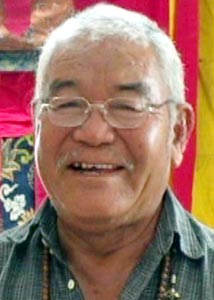Name: Tenzin Lhagyal
(Alias: No)
Gender: Male
Interview Age: 74
Date of Birth: 1933
Birthplace: Nyapso, Utsang, Tibet
Year Left Tibet: 1959
Profession: Servant
Monk/Nun: No
Political Prisoner: No

Interview No.: 20
Date: 2007-06-29
Language: Tibetan
Location: Lugsung Samdupling Settlement, Bylakuppe, Karnataka, India
Categories: Culture and History
Keywords: childhood memories, children's games, Chushi Gangdrug guerrillas, escape experiences, farm life, forced labor, refugee in India -- life as, servitude, Utsang
Summary:
Tenzin Lhagyal is from a village called Nyapso. He demonstrates and describes how, as a child, he used to play different games with stones and yak horns. Usually the prize would be chang 'home-brewed beer,' which everyone, winner and losers, drank together, debating and analyzing the game. The land in Tenzin Lhagyal's village was placed under the control of the estate of Ling Rinpoche, senior tutor to His Holiness the Dalai Lama. Having been a servant to the previous land owner, Tenzin Lhagyal was called to Lhasa to look after the horses of the estate.
Tenzin Lhagyal did not face many problems after the Chinese invasion although he worked on a road crew when tax was imposed on Ling Rinpoche's estate by the Chinese. Tenzin Lhagyal remained in Lhasa until the Chinese took control of the city in 1959. When he heard the news that His Holiness the Dalai Lama had escaped from Tibet, he decided to leave as well. He felt fortunate to join some soldiers of the Chushi Gangdrug Volunteer Force who were also fleeing Tibet. He came to India through Bhutan and worked on a road crew before moving to Bylakuppe.
Interview Team:
- Rebecca Novick (Interviewer)
- Ronny Novick (Videographer)
- Tsering Dorjee (Interpreter)

